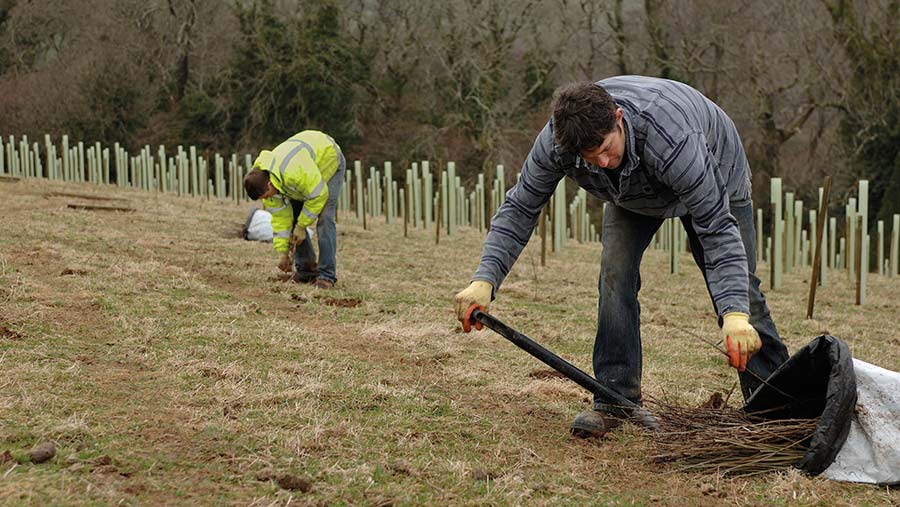Shortage of saplings hits planting scheme plans
 © Paul Glendell/Alamy Stock Photo
© Paul Glendell/Alamy Stock Photo Grant funding for farmland tree planting projects is in jeopardy because pressure on the supply of saplings means some projects are unlikely to get planted ahead of scheme deadlines.
A major focus on trees in environmental schemes is increasing demand to unprecedented levels, and nurseries are struggling to meet requirements.
Staffing problems as a result of Brexit and Covid have also had an impact on this year’s supply.
See also: How to plant the right tree in the right place on your farm
Initially, this limited the number of plants seeded and transplanted for this season, but it is now affecting the teams needed to lift the plants as the bare root season starts.
It takes up to three years to grow a sapling from seed for planting out, so there will be a time lag before supply catches up.
In England, Defra has advised scheme holders to contact the Forestry Commission grant teams if they need to change details in their agreement, including planting season and claim year.
“The Forestry Commission will consider amendment requests case by case,” a spokesman said.
Certain species ‘unavailable’
Similar advice has been issued in the devolved regions. The Welsh government has acknowledged some difficulties in supply, saying certain tree species were unavailable.
Farmers or land managers experiencing difficulties sourcing trees or completing their contracted work in the planting season should contact Rural Payments Wales immediately, a spokesman said.
Charles Beaumont, who grows 15m saplings a year on his farm in Northumberland, has already sold his entire stock of broadleaves, conifers and hedging plants for this season.
He said seed collected now would not produce a decent sapling until 2024 at the earliest.
“The time for planning for expanding production was four years ago, but no one saw this level of demand coming,” he said.
Mr Beaumont believes that within two years there will be enough production from existing nurseries to meet need. In the short term, however, it will be difficult for some farmers to source trees for their own grant-funded planting schemes.
Confor, a membership organisation that promotes sustainable forestry and wood-using businesses, said there was a high level of demand for all species.
Stewardship requirements
The requirement of Defra’s Countryside Stewardship woodland creation schemes, for 80% of plantings to be native broadleaves, has pushed up demand for those species.
Pig producer Oliver Corbett grows about 20,000 hedging plants a year on contract on 4ha near Shrewsbury and supplies these to a nearby nursery.
Carbon reduction schemes were having a major influence on demand, and he said this situation would probably continue for years. “It’s a growth area, particularly demand for home-grown stock.”
Defra said it was working to increase sapling production in domestic nurseries through its Nature for Climate Fund.
“This will help nurseries to develop existing facilities and invest in innovation to improve production capacity, helping to create resilient, healthy and genetically diverse planting stock,” a Defra spokesman said.
In Wales, a recent government-led exercise focused on the need to plan for the number of trees required to address any future shortfalls.
See also: How planting targets offer scope to increase home-grown tree stock
Case study: Farmer rethinks tree scheme entry after £15k penalty
A Welsh sheep farmer whose tree planting scheme was put on hold this year because of the saplings shortage may now abandon the project after being penalised £15,000 by Rural Payments Wales for a fencing error in a previous scheme.
David Mills had been awarded a contract to plant about 2.4ha of trees along the riverbank of his farm near Brecon, but with no trees available for him to plant he was told the scheme would be delayed.
Since then, he received a hefty penalty after satellite imagery showed that the fencing on an earlier scheme, 12,000 deciduous native trees planted on 7ha, was not precisely where it had been shown on the plans.
Mr Mills said all the trees had been planted according to the plan, but the fencing contractor had not installed the fence line with complete accuracy. Nonetheless, he was “flabbergasted” by the £15,000 penalty, which he is appealing.
The experience has put him off going ahead with his latest scheme, should saplings become available, he added.
